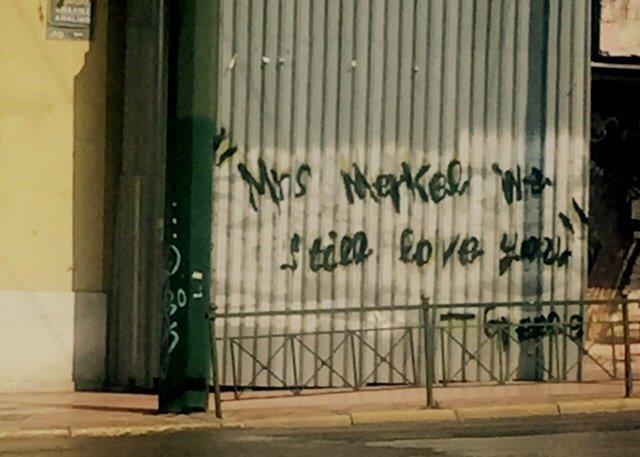The Greek Crisis and the Future of Europe
The president of the Church of God, a Worldwide Association, reflects on a recent trip to Greece and the prophetic implications of current events.

The world press confirms that Greece is in upheaval, but on the surface during our visit all seemed well. The financial crisis that forced the closure of banks lessened considerably during our weeklong visit. We saw no demonstrations, nor did we see any lines at ATMs or banks.
The day we arrived, Monday, July 20, was the first day the banks had been open since June 28, when the government shut them down and set the daily amount for an ATM withdrawal at 60 euros. But during our visit we were able to secure cash from the ATMs and did not see any overt signs of a problem. We witnessed the changing of the guard in front of the parliament building, climbed the Acropolis to view the city, visited a number of museums and walked around the Plaka, the shopping area in the center of the city.
A revealing piece of graffiti
Even though we visited many ancient sites, the one thing that stood out most in my mind was modern graffiti on the side of a building in downtown Athens. Here is what was written:
“Mrs. Merkel, we still love you.”—Greece.
The graffiti on the wall in downtown Athens was more than a love note for Mrs. Merkel. It was a clear sign of who is the iron and who is the clay in Europe.
This statement speaks volumes about the current situation in Europe. Greece has failed financially and defaulted on its bailout payments, but she is not alone. There are other countries on the precipice. Spain, Ireland, Portugal, Italy and Cyprus have all needed financial help from the European Union since 2008, when the current round of financial difficulties began.
Germany is one of the few European countries that seem to have their financial house in order. The German economy is as strong as the others are weak, and yet they are all locked together in the European Union. No country has ever left the European Union, and it seems that Germany and the other nations will do everything they can to prevent this from happening to Greece—or any other country, for that matter.
According to the May 9, 2015, online edition of The Economist, “Germany’s current-account surplus, [is] now the world’s largest.” In the same issue there is a cartoon about the German economy with the quip: “Thou shalt not fall into debt.” The economic discipline of the Germans stands in stark contrast to the way other European nations handle their finances.
The prophetic perspective
In Daniel 2 there is a prophecy about four major empires through history. The final one, the Roman Empire, is pictured at the time of Christ’s return as 10 toes made up “partly of potter’s clay and partly of iron” (Daniel 2:41). These toes represent 10 nations, or groups of nations, that will come together in the end time and eventually make war with Jesus Christ (Revelation 17:12-14, 17).
John identifies this group of 10 as having given “their power and authority to the beast” (Revelation 17:13), who will be the political leader of this combine of nations. But we see that this group will be short-lived and will not have the grandeur of the previous empires. It will be a mixture of strong nations and weak nations.
Europe today is poised to fulfill Daniel’s prophecy. The contrast between nations like Greece, Italy or Spain and nations like Germany is easy for all to see. But within Europe, where two world wars have been fought in the past century, there is such an overwhelming desire to stay together that an alliance will be sought to keep most nations, or at least 10 of them, in the union at all cost.
Prophecy shows that there will also be a religious influence in this resurrected Roman Empire. This is the woman who is described in Revelation 17 as riding the beast. Today Europe is mostly secular and nonreligious, so it is difficult to see exactly how this will happen. But if you consider a religious power that has been more political than religious throughout much of its history, you can see how this might actually take place with the development of a political alliance.
Please download our newest booklet, The Book of Revelation: The Storm Before the Calm, which comments on the scriptural evidence of this political and religious system that will come together to battle Christ upon His return. It is hard to know exactly where we are on the continuum of prophecy, but it is easy to see the mix—“partly of potter’s clay and partly of iron”—in existence in modern-day Europe.
Stay alert
Jesus Christ warned us not to allow ourselves to be taken by surprise as prophecy unfolds in the end time (Matthew 24:43-44). This is why it is so important for us to watch the world around us.
The graffiti on the wall in downtown Athens was more than a love note for Mrs. Merkel. It was a clear sign to those who understand prophecy of who is the iron and who is the clay in Europe. More developments must occur before we see the final configuration of Europe that will produce the prophesied beast power. That is why we must heed Christ’s message to “watch!” (Mark 13:37).
For further insight into Europe and prophecy, read these resources:
Date Posted: August 13, 2015

